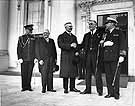
|
|
|

|

|

|

|
|
Click on an image to see a larger, more detailed picture.
|
|
|
|
|
| 1933: The Nazi State Begins |

|
pg. 60 |

|
|
|
|
| |
|
Who Is a Jew? As early as 1919, Adolf Hitler defined Jews as "a racial and not a religious group." His judgment was wrong and deadly. Not all Jews practice Judaism, but any person can become Jewish through religious conversion. Traditionally, anyone whose mother is Jewish has been identified as Jewish, but that condition is not necessary for Jewish identity, either. Presently, many Jews are citizens of the modern state of Israel, but a majority of the world's Jews do not fit that description. Who is a Jew? It's a complex question. Jews trace their origins to the biblical patriarch Abraham, who lived almost 4000 years ago. Judaism, a distinctively monotheistic religion, is rooted in the exodus of the ancient Hebrew people from Egyptian slavery and in experiences they shared under Moses' leadership at Mount Sinai. The early Jews' ritual laws and ethical rules distinguished them from other groups. Eventually occupying the Mediterranean coastal land of Canaan, the Jews established the kingdom of Israel. Unable to sustain the unity and autonomy it enjoyed from about 1000 to 922 b.c.e., the kingdom was split by internal divisions, besieged, and occupied by a variety of conquerors. In 70 c.e., the Romans ruthlessly put down a sustained Jewish rebellion. Most of the surviving Jews were dispersed to various parts of the Roman Empire. Exiled Jews have lived in European lands for more than 2000 years. Whether their outlooks are secular or religious, their homes in Israel, Europe, the United States, or anywhere else in the world, Jews are not a race but a people unified by memory and history, culture, tradition, and religious observances that are widely, if not identically, shared.
|
 Established in March 1933, Esterwegen in Germany was a "protective custody" camp. Like other concentration camps, Esterwegen housed Communists, high officials of the Weimar Republic, Jews, and common criminals. The SS guards often brutalized Jews and prominent inmates, and summary executions were not uncommon. When the camp was dissolved in September 1936, its inmates were transferred to a camp at Sachsenhausen, Germany.
Established in March 1933, Esterwegen in Germany was a "protective custody" camp. Like other concentration camps, Esterwegen housed Communists, high officials of the Weimar Republic, Jews, and common criminals. The SS guards often brutalized Jews and prominent inmates, and summary executions were not uncommon. When the camp was dissolved in September 1936, its inmates were transferred to a camp at Sachsenhausen, Germany.
Photo: Bildarchiv Preussischer Kulturbesitz/United States Holocaust Memorial Museum Photo Archive
|
 While the Nazis unleashed a terror campaign against political opponents at home, it was business as usual on the diplomatic front. Here Hjalmar Schacht, president of the German Reichsbank, shakes hands with U.S. President Franklin Delano Roosevelt (right) at an economic conference in Washington, D.C. Roosevelt was inaugurated as U.S. president on March 4, 1933, and would remain his country's leader for nearly the duration of the Holocaust.
While the Nazis unleashed a terror campaign against political opponents at home, it was business as usual on the diplomatic front. Here Hjalmar Schacht, president of the German Reichsbank, shakes hands with U.S. President Franklin Delano Roosevelt (right) at an economic conference in Washington, D.C. Roosevelt was inaugurated as U.S. president on March 4, 1933, and would remain his country's leader for nearly the duration of the Holocaust.
Photo: UPI/Corbis-Bettmann
|
|

|

|

|

|
 March 4, 1933: United States President Franklin Delano Roosevelt makes his inaugural address. He will remain as president throughout the Holocaust.
March 4, 1933: United States President Franklin Delano Roosevelt makes his inaugural address. He will remain as president throughout the Holocaust.
|
 March 5, 1933: The Nazis win 288 of 647 seats in the Reichstag election.
March 5, 1933: The Nazis win 288 of 647 seats in the Reichstag election.
|
 March 5, 1933: Individual German states are stripped of power.
March 5, 1933: Individual German states are stripped of power.
|
 March 9-10, 1933: A wave of riots begins against German Jews by the SA, so-called Storm Troopers of the Nazi Party, and Stahlhelm, a nationalist organization comprised of World War I veterans.
March 9-10, 1933: A wave of riots begins against German Jews by the SA, so-called Storm Troopers of the Nazi Party, and Stahlhelm, a nationalist organization comprised of World War I veterans.
|
 March 19, 1933: The Jewish War Veterans of America announces it will boycott German goods and services.
March 19, 1933: The Jewish War Veterans of America announces it will boycott German goods and services.
|
|
|
|
|
| 1933: The Nazi State Begins |

|
pg. 60 |

|
|
The Holocaust Chronicle
© 2009 Publications International, Ltd.
|
|
